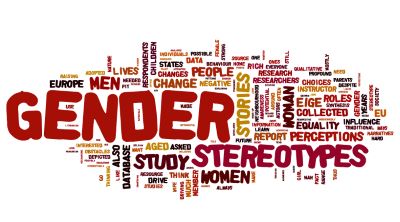Context-
At International Women's Day 2024, it is imperative to reflect on the state of gender attitudes in India. Despite strides towards equality, traditional perceptions of gender roles persist, influencing various aspects of life, including education, workforce participation, and household decision-making. Here we look into the changes observed in gender norms and attitudes in India during the 21st century, drawing insights from national surveys and reports.
Gender Attitudes Across 26 Countries: Insights from USAID Report
The USAID report examines gender attitudes across 26 countries, including India, using data from the Demographic and Health Surveys (DHS). It highlights a decline in men's inequitable gender attitudes, indicating a positive shift towards more equitable norms. However, disparities persist, particularly in attitudes towards women's contraceptive use and son preference. The findings underscore the importance of targeted interventions to accelerate progress towards gender equality.
Trends in India's Gender Norms: Insights from National Family Health Survey (NFHS) 2005-2021
Decline in Justification for Intimate Partner Violence
Data from the NFHS reveals a declining trend in the justification for intimate partner violence among Indian males aged 15-49. While progress is notable in certain scenarios, challenges persist, indicating the need for sustained efforts in shifting deep-rooted gender norms.
Fig: Proportion of Indian males (15-49) who would justify wife beating
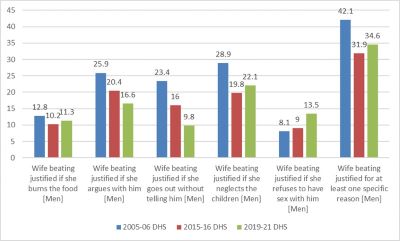
Increasing Autonomy of Indian Women in Household Decisions
The NFHS data also indicates a progressive increase in the autonomy of Indian women aged 15-49 in making large purchases. Particularly, younger women show significant gains, highlighting a positive shift towards financial empowerment and gender equality.
Fig: Proportion of Indian females (15-49) who say that they alone or jointly have the final say in making large purchases
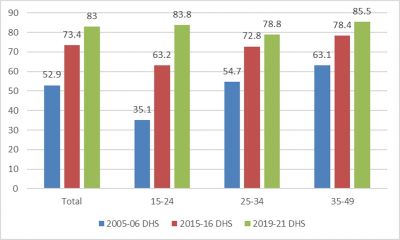
Rising Agreement on Justification for Wife Beating among Indian Males
Contrary to expectations, there is an increase in the proportion of Indian males who justify wife beating, especially in cases where the wife refuses sex. This concerning trend, particularly among younger age groups, calls for intensified efforts to promote respect for women's autonomy and consent.
Fig: Proportion of Indian males (15+) who agree that a husband is justified in hitting or beating his wife if she refuses to have sex with him.
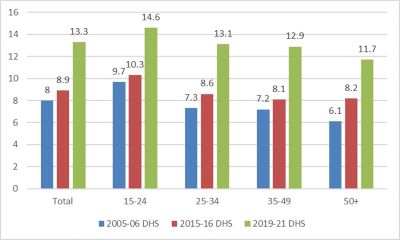
Family Planning Decision-Making in Indian Households
Family planning decision-making in Indian households reflects a consistent increase in joint decision-making by wives and husbands. However, decisions primarily made by husbands also show an uptick, emphasizing the importance of promoting equitable decision-making for fostering gender equality.
Fig: Family planning decision-making in Indian households
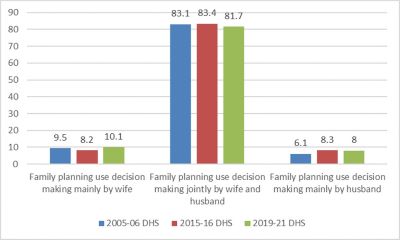
Persistent Son Preference in Indian Society
The data highlights a persistent son preference in Indian society, particularly evident in family planning decisions. Despite a gradual decline in the desire for more children, the preference for sons remains strong, reflecting entrenched gender norms that shape familial aspirations.
Fig: Currently married Indian males (15-49) with two children who want no more children disaggregated by the number of living sons
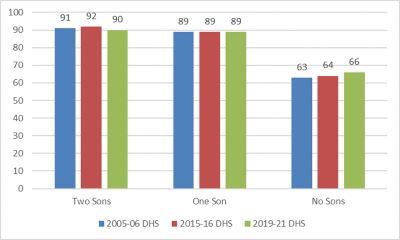
Recommendations for Future Action
Education and Awareness Campaigns: Implement targeted education and awareness campaigns to challenge traditional gender norms and promote gender equality from an early age.
Policy Interventions: Develop and implement policies that address gender disparities and promote women's rights in various sectors, including education, healthcare, and employment.
Community Engagement: Foster community engagement and grassroots initiatives to empower women, challenge harmful practices, and promote gender-sensitive attitudes and behaviors.
Support Services: Strengthen support services for survivors of gender-based violence and ensure access to resources and legal assistance for those in need.
Research and Data Collection: Invest in research and data collection efforts to monitor progress towards gender equality and identify areas for targeted intervention and improvement.
By prioritising these recommendations and fostering collaboration across sectors, India can continue its journey towards achieving gender equality and empowering all its citizens, regardless of gender.
In nearly two decades, India has witnessed a gradual yet definitive shift in gender norms and attitudes. While there are strides towards equality, challenges persist, especially regarding intimate partner violence and son preference. The data from NFHS underscores the importance of continued efforts to promote women's autonomy and foster equitable decision-making in households. As we celebrate International Women's Day, it is imperative to recognize both the progress made and the lingering concerns, urging for collective action towards realizing gender equality in India.
|
Probable Questions for UPSC Mains Exam-
|
Source- ORF

